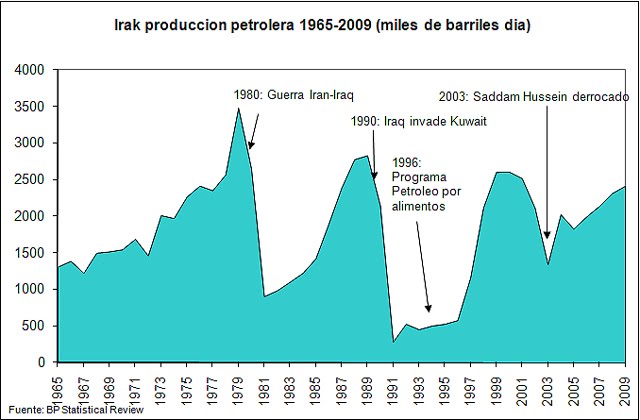(This article was originally published in Spanish in Cotizalia.com)
We’ve talked on other occasions of the difficulties that big oil companies find to grow. The reserve replacement ratio is still more than disappointing, below 100% since 2004. But in 2010 the industry could change course. In my opinion, the true hope of the sector is Iraq, the third country in the world in proven reserves, 115 billion barrels of oil, behind Saudi Arabia, with 264 and Iran with 138.
The country has generated much controversy in the press for the war but, since Saddam Hussein was overthrown, Iraq has achieved a production increase that was unthinkable under the previous regime, generating tax revenues for the domestic economy of almost $20 billion more that in the period 1980-2005.
Currently the geopolitical environment has improved substantially. Service firms are established, but the risks are not negligible, with nearby local elections, conflicts with the Kurdish minority and the gradual withdrawal of U.S. troops. For example, it remains unclear if the city of Kirkuk, home to a giant oil field, belongs to the Arabs or the Kurds, which prevents investment there.
The local government has advanced rapidly, licensing more than ten fields in the last year. After a false start in which the license auction was declared void (except the Rumaila field, BP -CNPC) because the conditions imposed by the government were too expensive, between the second half of 2009 and 2010 the government has auctioned licenses to operate up to 60 billion barrels in estimated reserves, with a national strategy to increase production from 2.5 million barrels per day today to a very ambitious target of 12 million. From BP, Shell, Statoil and ENI, to Russia’s Lukoil, China’s CNPC or Exxon, most big oil companies have participated in the process.
From my point of view, the goal of exceeding Saudi Arabia’s production is very ambitious. No one has managed to multiply by 5, as intended, the production of a country in 10 years. I think it’s much more logical to assume that production will rise to 3.5 million barrels per day in 2015, in line with the history of typical production recovery in this region (including Iran).
And the problem now is the costs, estimated at $ 19/barrel (F&D), plus an additional fee of nearly $ 2/barrel. The contracts allow the oil companies to cover costs up to a minimum production level. Until there is a contract typical of the industry,within what is called a PSC(production sharingcontract).
But if minimum production targets are not met, oil companies will suffer from profits lower than the average cost of capital, or even losses. The Zubair field, won by ENI and their partners, for example, will likely generate an internal rate of return of less than 20% below $55/barrel, while requiring investments in excess of $20 billion over 20 years.
If you have enjoyed Avatar (great movie, by the way) and the not-so-subtle allegory about the oil companies, you probably think that this whole process is abominable, but the increase in gross domestic product, infrastructure and wealth for the country that these projects, neglected or poorly managed so far, will generate, will be a giant leap for the country’s ailing economy. The investments to be carried out are astronomical, nearly $ 100,000 million between 2009 and 2029, including infrastructure, water, schools, hospitals , almost the construction of entire cities. Consider that some of these fields require about 500 workers. And the fact that contracts are aggressive and costly conditions for oil is a minor problem, because for them it is probably the last opportunity to improve their low reserve replacement for once.
